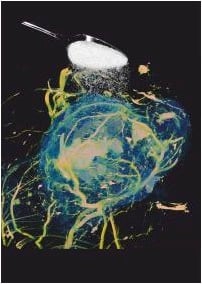
UCL scientists have developed a new technique for detecting the uptake of sugar in tumors, using magnetic resonance imaging.
July 10, 2013 — A new technique for detecting cancer by imaging the consumption of sugar with magnetic resonance imaging (MRI) has been unveiled by University College London (UCL) scientists. The breakthrough could provide a safer and simpler alternative to standard radioactive techniques and enable radiologists to image tumors in greater detail.
The new technique, called glucose chemical exchange saturation transfer (glucoCEST), is based on the fact that tumors consume much more glucose (a type of sugar) than normal, healthy tissues in order to sustain their growth.
The researchers found that sensitizing an MRI scanner to glucose uptake caused tumors to appear as bright images on MRI scans of mice.
Lead researcher Dr. Simon Walker-Samuel, from the UCL Centre for Advanced Biomedical Imaging (CABI) said: "GlucoCEST uses radio waves to magnetically label glucose in the body. This can then be detected in tumors using conventional MRI techniques. The method uses an injection of normal sugar and could offer a cheap, safe alternative to existing methods for detecting tumors, which require the injection of radioactive material." Professor Mark Lythgoe, director of CABI and a senior author on the study, said: "We can detect cancer using the same sugar content found in half a standard sized chocolate bar. Our research reveals a useful and cost-effective method for imaging cancers using MRI — a standard imaging technology available in many large hospitals."
He continued: "In the future, patients could potentially be scanned in local hospitals, rather than being referred to specialist medical centers." The study is published in the journal Nature Medicine and trials are now underway to detect glucose in human cancers.
According to UCL's Professor Xavier Golay, another senior author on the study: "Our cross-disciplinary research could allow vulnerable patient groups such as pregnant women and young children to be scanned more regularly, without the risks associated with a dose of radiation." Walker-Samuel added: "We have developed a new state-of-the-art imaging technique to visualize and map the location of tumors that will hopefully enable us to assess the efficacy of novel cancer therapies."
For more information: www.ucl.ac.uk



 February 13, 2026
February 13, 2026 









